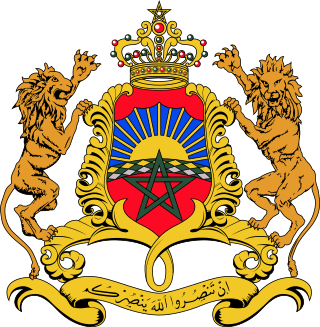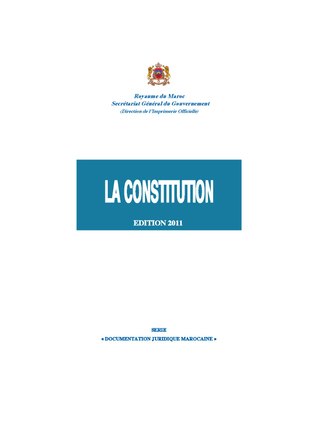
Politics of Morocco take place in a framework of an official parliamentary semi-constitutional monarchy, whereby the prime minister of Morocco is the head of government, and of a multi-party system. Executive power is exercised by the government. Legislative power is vested in both the government and the two chambers of parliament, the Assembly of Representatives of Morocco and the Assembly of Councillors. The Moroccan Constitution provides for a monarchy with a Parliament and an independent judiciary.

Presidential elections were first held in the United States from December 15, 1788 to January 7, 1789, under the new Constitution ratified in 1788. George Washington was unanimously elected for the first of his two terms as president and John Adams became the first vice president. This was the only U.S. presidential election that spanned two calendar years without a contingent election and the first national presidential election in American history.

Suffrage, political franchise, or simply franchise is the right to vote in public, political elections and referendums. In some languages, and occasionally in English, the right to vote is called active suffrage, as distinct from passive suffrage, which is the right to stand for election. The combination of active and passive suffrage is sometimes called full suffrage.
An electoral college is a body whose task is to elect a candidate to a particular office. It is mostly used in the political context for a constitutional body that appoints the head of state or government, and sometimes the upper parliamentary chamber, in a democracy. Its members, called electors, are either elected by the people for this purpose or by certain subregional entities or social organizations.

In the United States, the Electoral College is the group of presidential electors that is formed every four years during the presidential election for the sole purpose of voting for the president and vice president. The process is described in Article Two of the Constitution. The number of electoral votes exercised by each state is equal to that state's congressional delegation which is the number of Senators (two) plus the number of Representatives for that state. Each state appoints electors using legal procedures determined by its legislature. Federal office holders, including senators and representatives, cannot be electors. Additionally, the Twenty-third Amendment granted the federal District of Columbia three electors. A simple majority of electoral votes is required to elect the president and vice president. If no candidate achieves a majority, a contingent election is held by the House of Representatives, to elect the president, and by the Senate, to elect the vice president.

The president of India is the head of state of the Republic of India. The president is the nominal head of the executive, the first citizen of the country, as well as the supreme commander of the Indian Armed Forces. Droupadi Murmu is the 15th and current president, having taken office from 25 July 2022.

The National Diet is the national legislature of Japan. It is composed of a lower house, called the House of Representatives, and an upper house, the House of Councillors. Both houses are directly elected under a parallel voting system. In addition to passing laws, the Diet is formally responsible for nominating the Prime Minister. The Diet was first established as the Imperial Diet in 1890 under the Meiji Constitution, and took its current form in 1947 upon the adoption of the post-war constitution. Both houses meet in the National Diet Building in Nagatachō, Chiyoda, Tokyo.
Women's suffrage is the right of women to vote in elections. Several instances occurred in recent centuries where women were selectively given, then stripped of, the right to vote. In Sweden, conditional women's suffrage was in effect during the Age of Liberty (1718–1772), as well as in Revolutionary and early-independence New Jersey (1776–1807) in the US.

The governor of the Commonwealth of Kentucky is the head of government in Kentucky. Sixty-two men and one woman have served as governor of Kentucky. The governor's term is four years in length; since 1992, incumbents have been able to seek re-election once before becoming ineligible for four years. Throughout the state's history, four men have served two non-consecutive terms as governor, and four others have served two consecutive terms, the most recent being current governor Andy Beshear, who was re-elected to a second term on November 7, 2023. Kentucky is one of only five U.S. states that hold gubernatorial elections in odd-numbered years.

The Parliament of Australia is the federal legislature of Australia. It consists of three elements: the monarch of Australia, the Senate, and the House of Representatives. It combines elements from the Westminster system, in which the party or coalition with a majority in the lower house is entitled to form a government, and the United States Congress, which affords equal representation to each of the states, and scrutinises legislation before it can be signed into law.

The French Fourth Republic was the republican government of France from 27 October 1946 to 4 October 1958, governed by the fourth republican constitution of 13 October 1946. Essentially a reestablishment and continuation of the French Third Republic which governed from 1870 during the Franco-Prussian War to 1940 during World War II, it suffered many of the same problems which led to its end. The French Fourth Republic was a parliamentary republic.

There are three types of elections in Denmark: elections to the national parliament, local elections, and elections to the European Parliament. Referendums may also be called to consult the Danish citizens directly on an issue of national concern.

Women's suffrage – the right of women to vote – has been achieved at various times in countries throughout the world. In many nations, women's suffrage was granted before universal suffrage, in which cases women and men from certain socioeconomic classes or races were still unable to vote. Some countries granted suffrage to both sexes at the same time. This timeline lists years when women's suffrage was enacted. Some countries are listed more than once, as the right was extended to more women according to age, land ownership, etc. In many cases, the first voting took place in a subsequent year.

In the United States, a state is a constituent political entity, of which there are 50. Bound together in a political union, each state holds governmental jurisdiction over a separate and defined geographic territory where it shares its sovereignty with the federal government. Due to this shared sovereignty, Americans are citizens both of the federal republic and of the state in which they reside. State citizenship and residency are flexible, and no government approval is required to move between states, except for persons restricted by certain types of court orders.

A referendum on constitutional reforms was held in Morocco on 1 July 2011, called by the king in response to a series of protests across Morocco that began on 20 February 2011 when over ten thousand Moroccans participated in demonstrations demanding democratic reforms. A commission was to draft proposals by June 2011. A draft released on 17 June foresaw the following changes:

Early general elections were held in Morocco on 25 November 2011, brought forward from 2012 and then postponed from 7 October 2011.

The Constitution of Morocco is the supreme law of the Kingdom of Morocco. The constitution defines Morocco as a constitutional monarchy and lays out the fundamental rights of Moroccan citizens, it also defines the basis and structures of government, the council of ministers, and the parliament.

Municipal elections were held on 19 March 2014 in most municipalities in the Netherlands. This election determines the composition of the municipal councils for the following four years.

The United States elections of 1788–1789 were the first federal elections in the United States following the ratification of the United States Constitution in 1788. In the elections, George Washington was elected as the first president and the members of the 1st United States Congress were selected.

Women's suffrage in the Spanish Second Republic period was the result of efforts dating back to the mid-1800s. Women and men working towards universal suffrage had to combat earlier feminist goals that prioritized social goals, including access to education, political rights such as a woman's right to vote and equal wages. As a middle class developed and women gained more access to education, they began to focus more on the issue of suffrage but this was often around specific ideological philosophies; it was not tied into a broader working class movement calling for women's emancipation.















